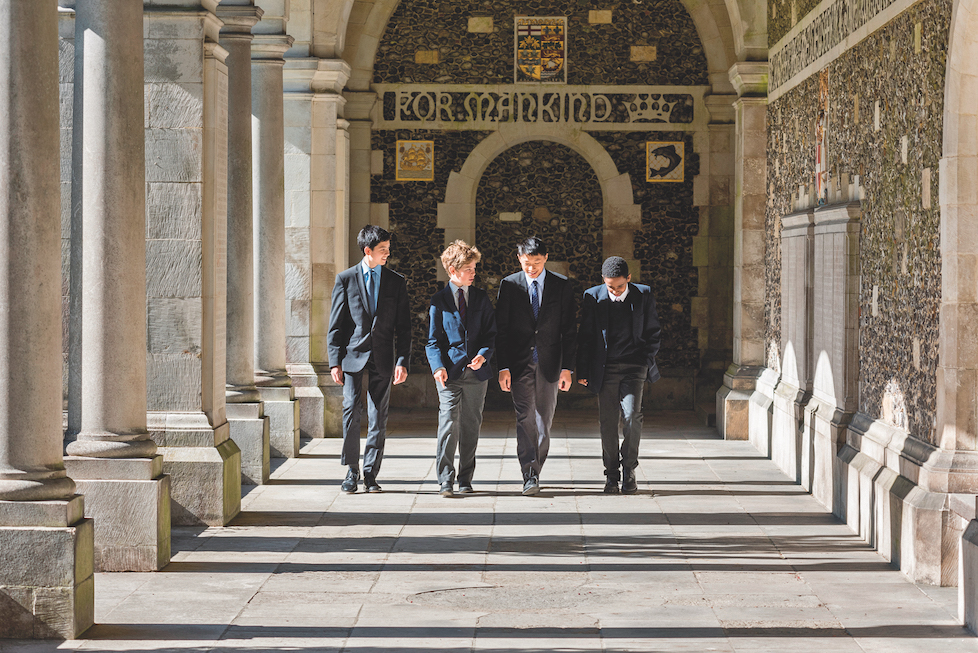Head Teachers’ Integrity
By
4 years ago

The decision of whether to accept or reject bursary donations with caveats can cause some head-scratching, finds Eleanor Doughty

Just after Christmas 2019, it struck. ‘Elite schools snub one million pound gift for poor white boys,’ read the headline in The Times. Independent schools were in the national press – again.
In December the story broke that mathematician Professor Sir Bryan Thwaites had offered to leave funds to both Winchester College and Dulwich College in his will. The money was intended for the benefit of white British boys from disadvantaged homes. Both schools – where Sir Bryan was educated – declined his offer. At the time, a spokesman for Winchester said that ‘acceptance of a bequest of this nature would neither be in the interests of the school as a charity, nor the interests of those it aims to support through its work’. Dulwich’s spokesman said that, ‘Bursaries are an engine of social mobility and they should be available to all who pass our entrance examinations, irrespective of their background.’ The Times’ editorial judged it ‘a shortsighted decision that is made worse by the sententiousness of the schools’ justification for their decision’. But was this a true case of discrimination?
Dr Tim Hands has been headmaster of Winchester College since 2016. Speaking from the college during national lockdown, he was more than happy to explain the decision. ‘We’re enormously grateful to all benefactors,’ he says. ‘The intention of our founder, William of Wykeham, was that Winchester College should be available to people who could not afford it.’ Winchester has two principles for bursary help, says Dr Hands. ‘You have to have the academic ability and the financial inability. These principles are clear, and muddying them in any way becomes complicated.’ He stands by the decision not to accept Sir Bryan’s money. ‘The governing body felt it would be inappropriate to discriminate on race, religion, or on any other factors.’ What of the Stormzy scholarship at Cambridge University, offering tuition fees and a maintenance grant for black students? ‘Cambridge does not have a reputation for accepting black people in large numbers.’

Then there are those who would have taken the money. One such figure is Andrew Halls, headmaster of King’s College School, Wimbledon. ‘The reason I agreed with what Bryan Thwaites was saying is that the white working class demographic is the most underachieving in the UK. Focussing on problems is the only way to solve them,’ he explains. ‘We get a lot of ambitious Asian families, but the white working class are the hardest to reach. I don’t like having to refer to demographics in terms of racial identity, but I feel strongly that there’s no point in pretending something isn’t happening when it is.’

Halls is not the only leading education figure with this view. ‘Saying no was an act of madness,’ says Dr Martin Stephen, former high master of both Manchester Grammar School and St Paul’s School, and author of The English Public School – an Irreverent and Personal History. ‘When I was offering bursaries I was snowed under with applicants from immigrant families who were hungry for education. But we don’t all see education as a first-class ticket here.’ Barnaby Lenon, chairman of the Independent Schools Council and former headmaster of Harrow, would also have taken the cash. ‘I understand why Winchester and Dulwich didn’t,’ he says, ‘but I would have accepted the money because I would have been able to find a low-income white boy to benefit from it.’
Stories such as this one run a risk of muddling an already complex system further. There is a narrative around financial assistance in independent schools – one pushed by politicians – that this should only be for those who cannot afford to pay for education at all. But what of those in the middle? ‘Offering bursaries at 20, 30, 40 per cent – these aren’t part of the normal demographic,’ says Halls. ‘Parents who can afford 60 per cent of £40,000 per annum, those aren’t normal people. Those are extremely wealthy people. At King’s, we feel that our bursary funding should be aimed at 100 per cent. You could end up spending everything on the distressed middle-class. For me that’s not the priority.’ Dr Stephen agrees that not all parents are deserving of financial assistance. ‘It’s dangerous to offer bursaries to those who earn over £120,000,’ he says. ‘It sends the wrong message, and it’s appalling PR.’ St Paul’s, where boarding fees are £12,997 a term, offers assistance to families on a combined salary of up to £120,000. It is a mark of how grossly inflated fees have become that those earning £120,000 might require help.
Balancing bursary funding within school is undeniably tricky, for how do you cut the cake? ‘If you’re filling your school, you don’t necessarily want to give all your money to a small number of pupils who would normally be on free school meals,’ says Lenon. Dr Hands agrees. Fees for Winchester College are £41,709 a year, and bursary awards range from five to 100 per cent of fees. This spread is key, says Dr Hands. ‘If you end up just with people who can afford the full fee, and those who absolutely can’t, you’ve got the 100 per cent and the zero per cent, with nowhere in the middle. That’s not the kind of school that anyone wants.’ William of Wykeham’s will, he adds, states a boy ‘should be able to come here if he is from an unexceptional background. The idea that independent schools should only be taking people from impoverished backgrounds is historical claptrap.’

Even if the world of bursaries seems intimidating for the first-time buyer, it needn’t be. ‘Parents should be bold and ask questions,’ says Lenon. ‘We know that parents don’t ask about bursaries because they think it will be in some way shaming, which isn’t how schools regard it at all. They like giving bursaries if they’ve got the money – they’re proud to do so.’ This is contrary to a myth that suggests that ‘in order to justify charitable status, schools pay lip service to bursary schemes,’ says Dr Hands. ‘But it’s not remotely true.’ The Charities Act of 2006 obliged all charities to demonstrate public benefit. For independent schools this meant that five per cent of income must be paid as full bursaries, or the school would risk losing its charitable status. ‘We don’taim for more than five per cent because of legal threat, we aim for more than five per cent because of what we believe in,’ adds Dr Hands.
Yet over the years, schools have not always been good at disseminating information about financial assistance, says Susan Hamlyn, director emerita of The Good Schools Guide. ‘A lot of parents are worried about approaching a school out of the blue because they have no idea what kind of reception they will get. Many find it intimidating, even if they have a sense of the possibilities available.’ And there are plenty of opportunities to be had, though there is no portal listing opportunities nationwide. Wellington College offers bursaries for up to 95 per cent of school fees, while for ten years, Oundle’s Life-Changing Bursary Scheme has supported those ‘from disadvantaged backgrounds’. Durham School offers a variety of scholarships with fee remission, including funding of up to 100 per cent for ‘academically and musically elite pupils of Chinese ancestry’, as part of the Peter Lee Scholarships programme.
Dr Stephen observes a general problem with the independent school sector is one that is tied up with financial assistance. ‘Independent schools have reacted to what the people with the money to pay for education wanted from education,’ he says. ‘Back in the days of Thomas Arnold it was all about being a gentleman. In the 1960s it became about getting into Oxford and Cambridge, as a result of what the parents wanted. The sector hasn’t created anything, it’s simply been a chameleon, changing colour in light
of the parents, and it’s not listening anymore. It is like a Doctor Who who has forgotten how to regenerate.’
This article was originally published in the 2020/21 issue of Scholarships & Bursaries
Read about top sporting scholarships here



